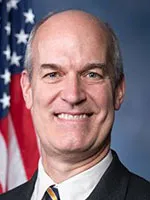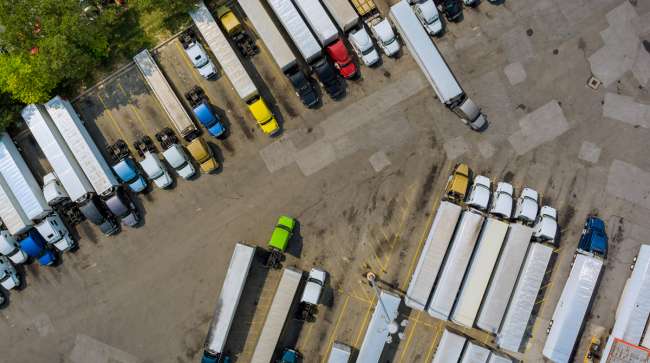“The 2021 Infrastructure Investment and Jobs Act failed to allocate dedicated funding for truck parking initiatives,” Elliott said. (photovs/Getty Images)
WASHINGTON — Transportation stakeholders pressed for major expansions to truck parking capacity during a congressional hearing where policymakers highlighted the contributions truck drivers make to the nation’s economy.
“Despite the importance of trucking to our communities and the supply chain at large, challenges continue to plague the trucking industry and the men and women behind the wheel,” said Rep. David Rouzer (R-N.C.), chairman of the House Highways and Transit Subcommittee.
Members of the panel, tucked within the House Transportation and Infrastructure Committee, displayed bipartisan support for issues that matter to trucking during the March 26 session.
“As we consider the next surface transportation reauthorization bill, we must continue the safety investments we made in the Infrastructure Investment and Jobs Act,” said Del. Eleanor Holmes Norton (D-D.C.), the subcommittee’s ranking member, in a reference to the $1.2 trillion bipartisan infrastructure law signed by former President Joe Biden. “These programs are currently deploying infrastructure across the country that will protect bicyclists and pedestrians from avoidable truck crashes. This Congress, we have an opportunity to maintain these efforts and find new ways to make progress on safety.”
(T&I Committee Republicans via YouTube)
Stakeholders appearing before the panel pressed for initiatives to expand access to safe truck parking in the next long-term transportation funding package, targeted for 2026.
“I strongly urge you to include the truck parking language in the next highway reauthorization bill,” said John Elliott, past chairman of the Truckload Carriers Association. He noted that one parking-specific proposal, the bipartisan Truck Parking Safety Improvement Act, has failed to advance through Congress but contains “must-have language” that should be incorporated into any upcoming highway policy bill.
“The 2021 Infrastructure Investment and Jobs Act failed to allocate dedicated funding for truck parking initiatives,” Elliott said in a statement. “This oversight must be corrected to ensure the safety and efficiency of our nation’s trucking workforce.”
Per analysis from American Trucking Associations, there is one truck parking space available for every 11 drivers.
In 2024, the American Transportation Research Institute ranked inadequate access to parking second on its “Critical Issues in the Trucking Industry” report. Per ATRI: “Until Congress establishes a dedicated federal source of funding for truck parking, states will need to apply for parking capacity expansion resources through one of several U.S. [Department of Transportation] infrastructure investment programs.”
“A lack of available parking spaces forces truckers to choose between parking in a potentially unsafe location, such as a highway shoulder, or continuing to drive while they feel fatigued or are out of available driving hours under federally mandated hours-of-service (HOS) regulations. Increasingly, these factors are also negatively affecting the safety of the driving public,” said Lewie Pugh, executive vice president of the Owner-Operator Independent Drivers Association.
Reps. Mike Bost (R-Ill.) and Angie Craig (D-Minn.) are the truck parking bill’s lead sponsors in the House. “Truck drivers keep our nation’s supply chains moving, and they should never be forced to forgo much-needed rest because of insufficient highway parking,” Craig, ranking member of the Agriculture Committee, said recently. “Increasing rest spot availability means a safer and more efficient road for truck drivers and everyday commuters alike.”
The next major highway bill is also expected to emphasize safety.

Larsen
“People are the backbone of our supply chain — truck drivers, railroad workers, longshoremen, and warehouse workers — who support moving goods from point ‘A’ to point ‘B,’ ” said Rep. Rick Larsen (D-Wash.), the Transportation and Infrastructure Committee’s ranking member. “Protecting the safety of truck drivers and the traveling public must be our top priority.”
Stakeholders also stressed the need to promote transportation safety.
“The task before you is substantial — a surface transportation bill has the ability to improve roadway safety, increase the quality of life for workers in the trucking industry, foster responsible innovation and strengthen American infrastructure and supply chains,” said Cole Scandaglia, senior legislative representative and transportation policy adviser with the Teamsters union. “Both the full committee and this subcommittee have a long history of strong bipartisan reauthorizations.”
The National Highway Traffic Safety Administration determined there were nearly 41,000 motor vehicle traffic fatalities in 2023.

Rouzer greets the crowd at a 2022 rally for President Donald Trump in Wilmington, N.C. (Chris Seward/Associated Press
Both Rouzer and Holmes Norton also emphasized the importance of safety to trucking.
“The bottom line is that truckers deliver essential goods when disaster strikes and serve as a key partner in larger emergency coordination and relief efforts. While federal law provides for targeted regulatory relief from certain restrictions, we will continue to explore ways to help improve disaster response outcomes,” Rouzer said.
Holmes Norton added, “I have long supported strong entry-level driver training standards to ensure that truckers are fully prepared to safely operate their vehicles and deliver their freight.”






